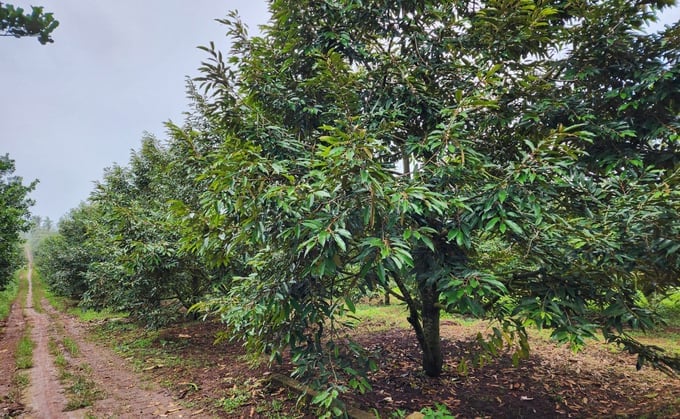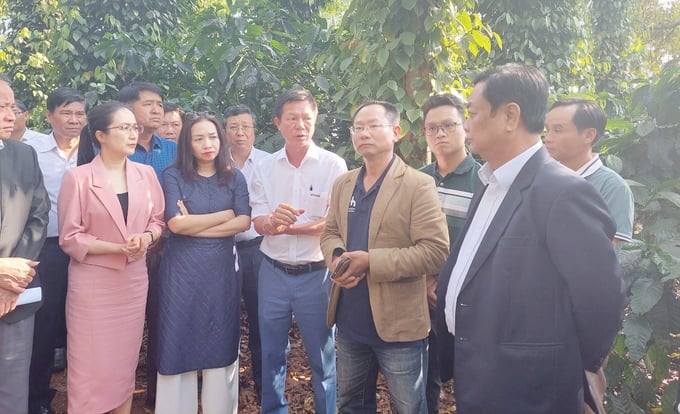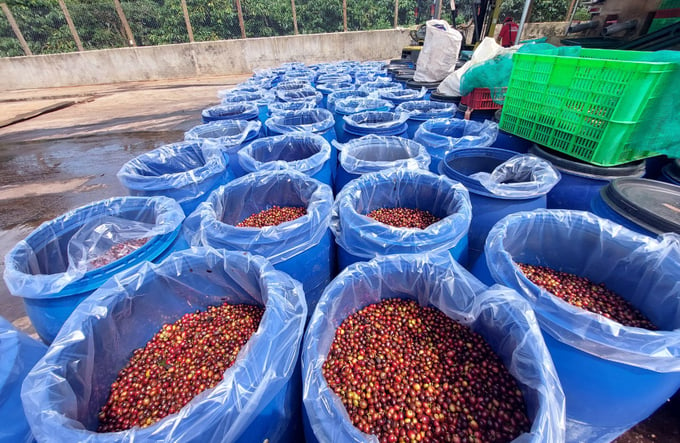May 17, 2025 | 15:21 GMT +7
May 17, 2025 | 15:21 GMT +7
Hotline: 0913.378.918
May 17, 2025 | 15:21 GMT +7
Hotline: 0913.378.918
The residents of Krong Nang district in Dak Lak province are actively hiring laborers to fertilize and prune their durian orchards after a season of abundant harvest in early November. Many households in Krong Nang district have earned billions of Vietnamese dong in profit due to the recent successful and profitable durian crop.
Mr. Phan Viet Phuong's family in Luc Bang hamlet, Phu Loc commune, Krong Nang district owns over 3 hectares of durian trees planted since 2015. Mr. Phuong's family recently harvested over 40 tons of durian, selling at an average price of over 60,000 Vietnamese dong per kilogram. After deducting expenses, his family made a profit of nearly 2 billion Vietnamese dong.

Mr. Phan Viet Phuong's durian farm yielded a profit of nearly 2 billion Vietnamese dong in the 2023 harvesting season. Photo: Quang Yen.
"Our family previously cultivated smallholder rubber trees, but due to a significant drop in prices, we decided to uproot them in 2015 and plant durian instead. In addition to durian, our family also planted 300 macadamia trees. Subsequently, we harvested 3 tons of macadamia nuts for an additional profit of 200 million Vietnamese dong. The fertile land and soil in Krong Nang district is ideal for growing coffee and various fruit trees such as durian and macadamia. Achieving an income like this is a dream come true for us farmers," expressed Mr. Phuong enthusiastically.
On the other hand, coffee farming households in Krong Nang district also enjoy higher prices from this year's harvest. Mr. Ta Duy Thanh's family in Thanh Cao hamlet, Ea Tan commune, Krong Nang district manages a 3-hectare coffee farm in association with the sustainable coffee production chain of the Simexco DakLak Company.
According to Mr. Duy, by participating in the production chain, his family were provided with training sessions, workshops on scientific and technical knowledge, guidance on fertilization, irrigation, labor protection, processing, product preservation, and sustainable crop development. As a result, their coffee farm has seen an increased productivity of 0.5 to 0.7 tons per hectare, and a reduction in various investment costs.
By strictly adhering to sustainable coffee production processes, Mr. Thanh's family continued their partnership with Simexco DakLak to produce specialty coffee in 2016. They received a 50% cost support for building a greenhouse to ensure the quality of the coffee drying process.

Coffee farmers in Krong Nang district are enjoying a bountiful harvest with high prices. Photo: Quang Yen.
"Sustainable coffee production ensures a ripe fruit rate of over 90%. Additionally, appropriate initial processing has met the demands for specialty coffee production. This year, my family's coffee crop was successful and Simexco DakLak purchased it at a price 30,000 Vietnamese dong per kilogram higher than the market," stated Mr. Thanh.
Mr. Ly Tri Thang, Director of Ea Tan Cooperative in Krong Nang district stated that the cooperative was established in 2015 with the aim to assist farmers in changing their production mindset and providing stable market outlets. All members of the cooperative as well as affiliated members are currently following the landscape coffee production process. During the harvesting period, the cooperative requires linked households to achieve an absolute ripe fruit rate.
"This year, the cooperative's coffee output exceeded 350 tons. All of which were processed according to standard procedures to create a high-quality and specialty coffee brand. By ensuring ripe coffee fruit during harvesting, the quality of the coffee beans has significantly improved, meeting export standards," explained Mr. Thang.
Mr. Thang added that the local fresh coffee is currently priced at 12,000 Vietnamese dong per kilogram, which is higher than that of the previous year by 4,000 to 5,000 Vietnamese dong per kilogram. "The quality of coffee in Krong Nang district has been widely praised by experts, owing to its naturally favorable conditions, including soil quality and a climate well-suited for coffee production. Coffee from Krong Nang has considerable potentials to be made into high-quality and specialty coffee. This year's high coffee prices will enable farmers to attain better incomes," remarked Mr. Thang.

Minister of Agriculture and Rural Development Le Minh Hoan (far right), along with the Ministry's delegation, during their visit to the landscape coffee farm in Ea Tan Cooperative. Photo: Quang Yen.
"This year's high-quality coffee harvest will be purchased by the affiliated company (Simexco DakLak) at prices 15,000 Vietnamese dong per kilogram higher than that of the market, whereas the ripe coffee, or specialty coffee, is expected to be purchased at prices 30,000 Vietnamese dong per kilogram higher than that of the market. Simexco DakLak is currently purchasing up to 85% of the coffee output of the Cooperative," added Mr. Ly Tri Thang.
Mr. Le Ky Su, Head of the Krong Nang district's Department of Agriculture and Rural Development, noted that the local government has provided numerous programs and policies in support of agricultural development. Presently, the district is implementing a production program in combination with resource conservation and social welfare (known as the Compact Krong Nang). This program, sponsored by the Sustainable Trade Initiative (IDH - the Netherlands), involves the participation of local governments, JDE Group, VnSAT Project, Simexco DakLak, among others. The initiative is divided into two phases: Phase 1 from 2019 to 2020 and Phase 2 from 2021 to 2025.
The program initially covered 5,200 hectares of crops with 4,000 participating households in a segment of three communes: Ea Tan, Ea Toh, and Dlie Ya within Krong Nang district. Following the success of the first phase, the District People's Committee has proposed to IDH, JDE Group, and Simexco DakLak to continue supporting and expanding the program's scale across the entire district to encompass 12 administrative units at the commune and town levels, with a total area of over 23 thousand hectares of coffee, 3.6 thousand hectares of pepper, and 5.1 thousand hectares of various fruit trees.

Krong Nang district holds considerable and favorable potential for the development of high-quality and specialty coffee. Photo: Quang Yen.
According to Mr. Le Ky Su, the program is aimed at conserving land, water, and forest resources, ensuring sustainable production, enhancing organic and biological fertilization, reducing the use of chemical fertilizers and pesticides, increasing intercropping, shade trees, and scattered trees, managing land cover, improving surface water irrigation rates, and efficient water usage. Additionally, it aims to increase farmers' income by reducing investment costs, enhancing product quality, boosting earnings from intercropped plants, and market access.
"The region's soil, climate, and natural conditions are highly conducive for cultivating various industrial crops and fruit trees such as coffee, durian, macadamia, and lychee. The produce in Krong Nang district, such as early ripening lychee and late-ripening durian, offers price advantages over other regions. Furthermore, the local population has progressively enhanced their farming techniques, integrating scientific knowledge into production. The crops transported from the province to Krong Nang district for cultivation exhibit robust growth and yield high-quality produce," Mr. Su stated.
Mr. Su added that the local government has shown significant interest in agricultural development over recent years, implementing numerous supportive policies regarding crop and livestock production, and regularly organizing scientific and technical training sessions for farmers. "With these advantages and support policies, the agricultural sector in Krong Nang district will be able to experience sustainable growth in the future," Mr. Su concluded.
Krong Nang district comprises over 56 thousand hectares of agricultural land, including approximately 25 thousand hectares of coffee production with a yield of over 69 thousand tons, and nearly 6 thousand hectares of durian production with a yield of 20 thousand tons.
Translated by Nguyen Hai Long

(VAN) Muong Nhe Nature Reserve hopes that being upgraded to a national park will lay the foundation for forest protection efforts to be carried out in a systematic, modern, and sustainable manner.
/2025/05/16/3923-2-171845_52.jpg)
(VAN) Lower costs, higher yields, and improved soil quality are outstanding benefits that soybeans bring when integrated into the crop rotation system.

(VAN) The 'For a Green National Environment' programme aims to promote a green lifestyle, support businesses in implementing ESG practices, and turn Net Zero commitments into concrete actions.

(VAN) Cold-barn systems efficiently manage environmental and temperature conditions, which aids in the prevention of respiratory diseases in pigs and protects them from the vectors that transmit African swine fevers.

(VAN) To tackle challenges, the project 'Addressing key technical bottlenecks in the grouper supply chain in Vietnam' has been underway since 2024.

(VAN) The project 'Disease-Resilient and Sustainable Cassava Production Systems in the Mekong Region', funded by the Australian Center for International Agricultural Research (ACIAR), is being implemented from 2024 to 2028.

(VAN) Data from 10,000 farming households will help professionalize production organization and support the implementation of the One Million Hectares Program for High-Quality, Low-Emission Rice Cultivation.